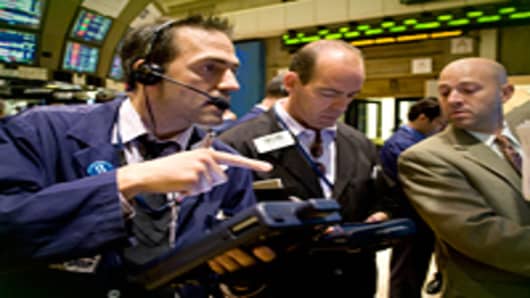Near-zero interest rates aimed at pushing investors out of bonds and into stocks appeared to gain some traction as 2011 drew to a close, raising hopes that investors are ready to take on more risk.
Flows into stock-based exchange-traded funds accelerated late in the year even as the broader market meandered and money moved out of stock-based mutual funds.
That was a sign to some strategists that late-year sellers for tax purposes were moving not to the safety of bond funds or cash but rather staying in stocks. Those sellers opted for ETFs, which are more flexible than mutual funds as they can be traded like stocks, but more diversified than equities as they provide exposure to entire sectors rather than just individual companies.
"This follows a trend several industry sources have noted recently; namely, that tax-loss selling of single-stock investments as well as mutual funds tends to get recycled into exchange-traded products," Nicholas Colas, chief market strategist at ConvergEx in New York, said in a note to clients.
Colas attributes the move in large part to low interest rates.
Pension funds and other institutional investors, with mandates to show 7 percent to 8 percent returns, cannot meet their requirements with a large allocation to 10-year Treasurysand their sub-2 percent returns.
As such, they're being pushed into riskier assets.
"There's no way to go to an auditor and say, 'I'm going to satisfy my rate of return requirement with a 2 percent government bond,'" Colas said in an interview. "The only way the pension funds continue to hold an outsized expectation for return is to buy riskier assets like stocks."
Stock ETFs saw inflows of $33 billion for the year, but more than half came in the final quarter despite a listless performancefor the final two months.
While bond funds remained the most popular destination for new cash in 2011, with $36 billion flowing in, the late surge helped stock funds keep pace. The ETF industry overall holds $1.06 trillion in funds, with $108 billion in fresh capital for 2011.
The Federal Reserve's ability to keep rates low, then, could be critical to whether the stock marketturns a profit after a lackluster year.
"People are fed up with zero interest rates," said Michael Cohn, chief market strategist at Global Arena Investment Management in New York. "Once the clouds start to part a little bit, that will bring people back to the market."
Cohn says he also has found the combination of low rates and high uncertainty a difficult climate, one which he's weathered by buying, among other things, short-term bank debt, master limited partnerships and beaten-down energy stocks.
Though stocks continue to churn, Cohn says "we're in the final stages of a bear market" that will break in the coming months when fear hits an apex and some optimism about the U.S. economy starts to creep in.
Yet improving economic sentiment could be a both blessing and curse — a blessing because better data is driving confidence that the after-effects of the financial crisis are waning, and a curse because it would end the Fed's easy-money policies.
Indeed, there's an underlying caution that the risk for rates is that they could move higher, despite what the Fed wants and even if the European debt crisis continues to generate fear of a global recession.
"Risks in Europe remain stable early in 2012," Jim Caron, head of global interest rate at Morgan Stanley, told clients. "As a result, taking both pricing and positioning of the (Treasurys) market into account, we think risks are skewed toward pushing yields higher as good economic data may be amplified in the price action of (Treasurys) while weaker data is likely to be muted because it will only reaffirm consensus expectations."
In that event, investors betting on low rates could get stung.
"I would warn investors that the Fed has done a spectacular job of controlling rates today and engineering this low-rate environment. They may not be able to do that forever," said Rob Lutts, chief investment officer at Cabot Money Management in Salem, Mass. "The market forces of recovery may force their hand quicker."
In that case, investors can expect still more volatility even coming after a roller-coaster year.
"My clients are very nervous — they're more nervous than they've been in decades," Lutts said. "On an earnings-yield basis, stocks are very cheap. Does it mean they perform immediately, like next week? Maybe not. You've still got issues in Europe. At some points things need to reverse here and appetite toward risk will become unleashed."



